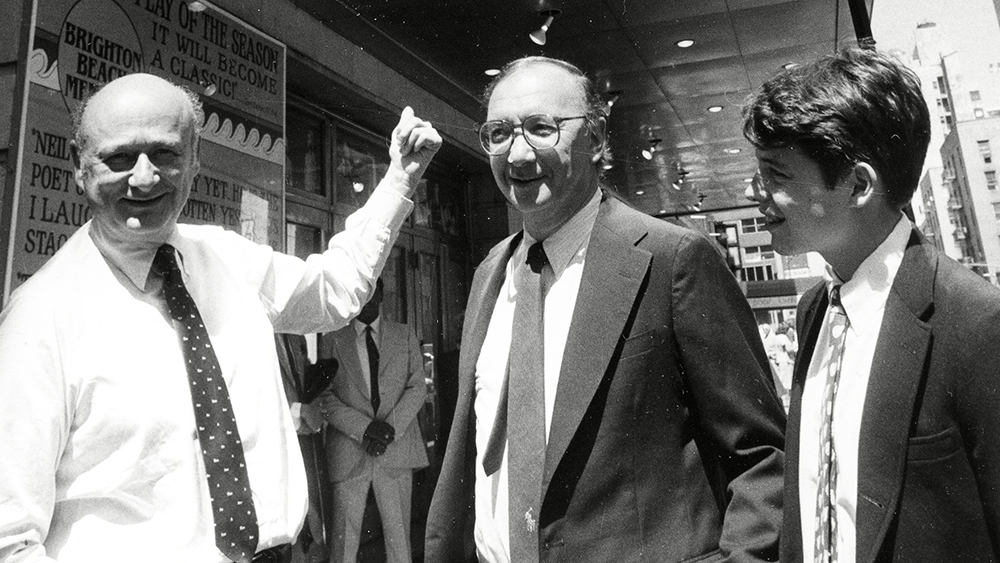Matthew Broderick on Neil Simon: ‘I Would Like One More Play’
By Debra Birnbaum
LOS ANGELES (Variety.com) – Matthew Broderick worked with Neil Simon five times throughout his career, onstage and on-screen. Here, he shares with Variety‘s Debra Birnbaum his memories of the acclaimed playwright, who died Aug. 26 at age 91 due to complications from pneumonia.
I met Neil through auditioning for “Brighton Beach Memoirs” in 1982. I’d auditioned in an office for a casting director a few times, and then finally worked my way to auditioning on a stage. “Ain’t Misbehavin’” was playing in the theater, and Neil was in the house. There was a whole group of us, and when I read, I do remember very distinctly hearing him laugh. It was great. Part of me was thinking, “Oh, he likes laughing at his own jokes,” but it was kind of a lengthy, giggly laugh, and it gave me some confidence. I was so nervous, and I remember just being so sort of flattered and comforted by that.
Then I got called back to read for him and the director, and at that audition they gave me a screenplay, a movie called “Max Dugan Returns,” which I had never heard of. They made me read every scene from that movie with the director, Herbert Ross, just sitting in the audience. And then I would go back onstage and read more from “Brighton Beach.” At the end of the day, I was told I had both parts. It was amazing. And it turned out to be one of the happiest times of my career.
Neil was very quiet and quite serious when he was rehearsing. He listened intently, and he was always concerned that a joke was good enough, and that we weren’t messing it up and that he hadn’t messed it up. It wasn’t exactly like a party, but there were definitely moments of amazing laughter. I remember rehearsing for the movie, which shot before “Brighton Beach,” on the set in California. They had built a kitchen and the whole house inside. We were on the kitchen set, and he was looking over the sink. He pulled out the rubber stopper, and he looked at me and said, “These are good on salad.”
He was incredibly kind when he was happy. He had no trouble expressing that. I would come to the dressing room, and there would be a letter on my dressing room table to tell me he loved me, that he was lucky he found me. On opening night he would give actors a page of the play in a Tiffany frame. I still have the one from “Brighton Beach,” and he wrote on it, “I never knew I was so cute or so talented.”
He could also be blistering. I also got letters when he didn’t love me — I’m not the only one who got letters occasionally that said, “Don’t ruin my play.” But as soon as he expressed that, he would forget it instantly. He never, ever held on to any temper. He would have it, and then it was gone.
I think his work can be heartbreaking and funny at exactly the same time. And he’s equally good at both of them. If you were doing something that was meant to be funny, you had to be truthful. You couldn’t be wacky. The more real you were, the funnier it always came out. He was also just an incredible technician; he would make trims or just change two beats in a joke and it would work. He was very shy, but inside that quiet, that non-talking person, his brain was just as fast as could be.
We had a scene in “Biloxi Blues” where I lose my virginity, and he had written a beautiful, sort of sad scene actually. We would rehearse it for weeks, getting pretty close to opening, when he said, “I want to take another look at it.” He left to go work on it, and he came back a few hours later with a whole new scene handwritten on a yellow legal pad. That’s my memory — I can’t even believe this is true. He said, “Here, take a look at this. I hear laughter here. It’s too maudlin.” And that scene became basically the big laugh in the play. I swear to you, he left for a few hours and came back with that scene, which is basically a classic in my opinion.
I find his death much more sad than I thought I would. Even when somebody dies who’s 91, it just feels like an era has passed. A huge chunk of my life was about him and his plays. I feel like people don’t give him the credit he deserves. He’s going to be one of our great playwrights. He is one of our greatest American playwrights. And I think his work will be [performed] forever.
I wish there was a little more of him, although I guess he’s the most prolific playwright maybe that ever was. So he deserved a rest. But I would like one more play.

